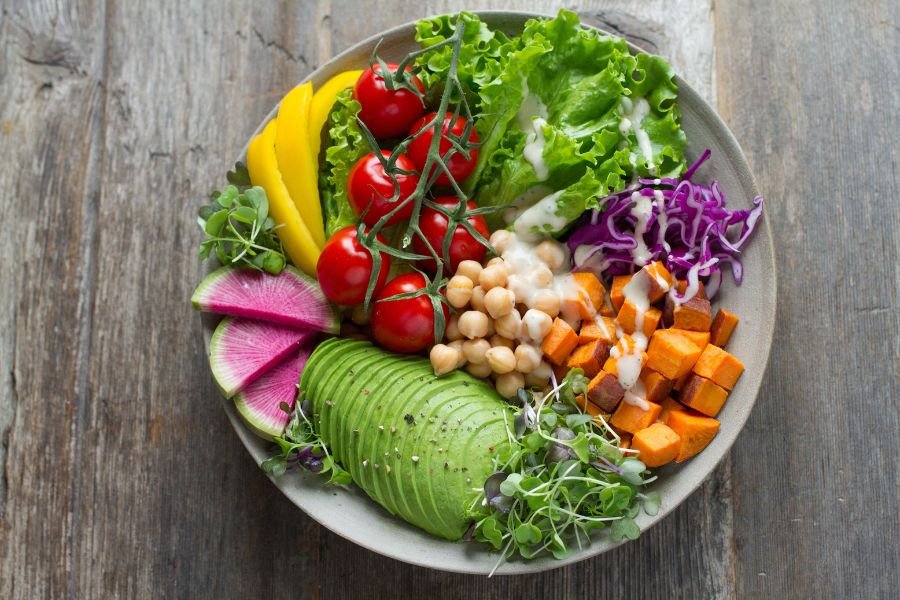When it comes to choosing what to eat, we live in a uniquely challenging era. Never before have humans known more about nutrition and how to eat for optimal health, and yet we’ve never been more surrounded by distractions and temptations that derail us from making healthy choices.
Some people might be able to decide “I’m going to eat healthier!” and do so without any problem, but those folks are unicorns. Most of us know what we should do, but need a little help making it happen—like some simple hacks, tips and tricks for avoiding pitfalls on the road to healthier eating.
While recognizing that what works for one person may not work for another, here are some helpful habits and approaches that might help you move closer to your healthy eating goals.

Goal: Snack on less junk food
Tip: Focus your willpower on the grocery store, not your home
Willpower is a limited commodity for most of us, and it is no match for a bag of potato chips sitting on top of the fridge. It’s just a fact. Channeling your willpower at the grocery store can save you from having to fight that battle at home. If you don’t bring chips into your house in the first place, you’ll find it a lot easier to reach for something healthier.
The key to successful shopping trips is to always go to the store with a specific list and a full stomach—you’ll feel much less tempted to buy the junky snack foods if you’re already satiated. Also, finding healthier alternatives that will still satisfy your cravings for salty or crunchy, or fatty foods helps. Sugar snap peas have a surprisingly satisfying crunch, apples and nut butter hit that sweet-and-salty craving, etc.

Goal: Eat less sugar
Tip: Instead of “deprive,” think “delay” or “decrease and delight”
Sugar is a tricky one. Some people find it easier to cut out added sugars altogether, but that can create an all-or-nothing mindset that all too often results in “all.” Eating more whole foods and less processed foods can help us cut out a lot of ancillary sugar, but we still live in a world with birthday cakes and dessert courses.
One approach to dessert temptation is to delay instead of deprive. Tell yourself you can have any sweet you want…tomorrow. This mental trick flips the “I’ll just indulge today and start eating healthier tomorrow” idea on its head. It’s a lot easier to resist something you know you can have tomorrow than to say no to something you think you’ll never get to have again.
Another approach when you really want to enjoy a dessert at that moment is to decrease the amount and really truly savor it. Eat each bite slowly, delighting in the full taste and satisfaction of it. As soon as that delight starts to diminish, even a little, stop eating. You’ve gotten what you wanted out of it. You don’t have to finish it. (After all, you can always have more tomorrow!)

Goal: Eat healthier meals
Tip: Focus on fresh foods and plan meals ahead of time
Meal planning is easier than ever before. The internet is filled with countless tools—everything from recipes to shopping lists to meal planning apps—and it’s as awesome as it is overwhelming.
Planning ahead takes the guesswork and decision fatigue out of cooking, preventing the inevitable “Let’s just order a pizza.” You can have a repeating 3-week or 4-week menu of your favorite meals so you never have to think about what you’re going to eat, or you can meal plan once a week to try new recipes and keep things fresh.
It might help to designate one day a week to “shop and chop”—getting and prepping the ingredients for the week’s meals so they’re ready to go in your fridge or freezer.

Goal: Eat more organic/humanely raised food
Tip: Utilize the “dirty dozen” and “clean 15” lists to prioritize
Many people choose organic because they want to avoid pesticides and other potentially harmful chemicals. Organic food is also better for the planet, and according to the Mayo Clinic, studies have shown that organic produce is higher in certain nutrients.
Most people don’t buy everything organic, but there are some foods that should take priority over others. Each year, researchers from the Environmental Working Group (EWG) analyze thousands of samples of dozens of fruits and vegetables. From this data, they create a list of the “Dirty Dozen” and “Clean 15” fruits and vegetables, indicating what produce has the most and least pesticide residue. These lists give people a good place to start focusing their transition to more organic foods.
To make organic eating even simpler, you can shop O Organics® at your local Albertsons or Safeway stores. The O Organics brand offers a wide range of affordable USDA-certified organic products in every aisle. If you’re focusing on fresh foods, O Organics produce is always grown without synthetic pesticides, is farmed to conserve biodiversity, and is always non-GMO. All animal-based O Organics products are certified humane as well. Even switching part of your grocery list to organic can make a positive impact on the planet and the people you feed.
Healthy eating habits don’t have to be all or nothing, and they don’t have to be complicated. A few simple mindset changes at home and habit changes at the grocery store can make a big difference.


































